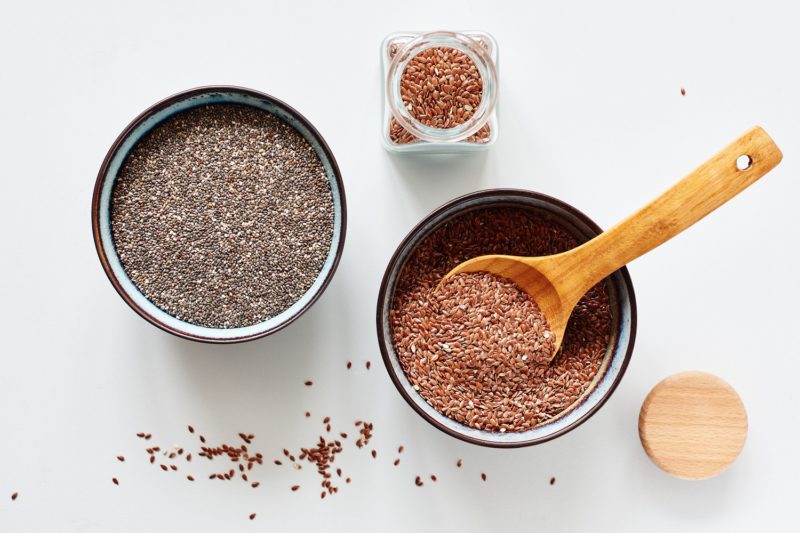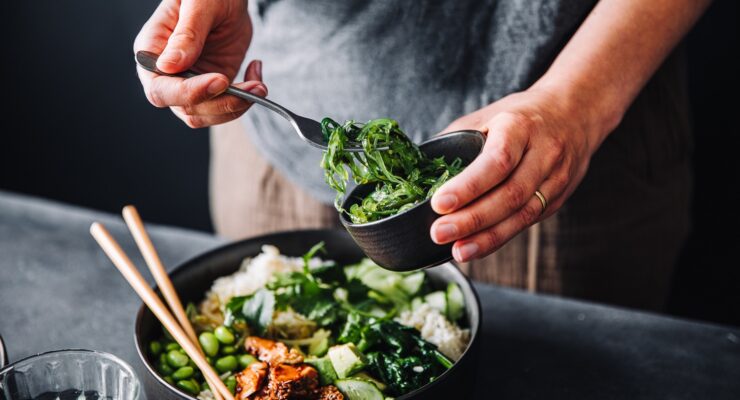Showdown of the Super Seeds: Chia Seeds vs. Flax Seeds
Article posted in: Diet & Nutrition
Seeds may be tiny, but they can punch up the flavor and texture of many dishes. Chia and flax seeds are even more potent–they’re packed with concentrated nutrients and come with a variety of nutritional benefits. Both are valuable plant sources of omega-3 fatty acids, good fats that are linked to a reduced risk of heart disease and other illnesses. So which is best for you, chia seeds vs. flax seeds? Let’s start with the facts about each.
Contender #1: Chia Seeds
The Stats:
1 Tbsp. (14 grams) of chia contains:
- 70 calories
- 2.34 grams of protein
- 5.97 grams of carbohydrates
4.36 grams of fat - 4.9 grams of fiber
- 89 mg of calcium
- 58 grams of potassium
Health Boosts:
Nutrient dense. Chia seeds are low in calories and a healthy source of fiber. Ounce for ounce, chia has twice the protein of the most common grains and five times more calcium than milk.
Antioxidant protection. The rich load of antioxidants in chia seeds support your immune system and help keep the seeds fresh for months.
Whole food. Your body can absorb chia seeds whole, so they don’t need to be processed or ground in any way before you eat them.
Better digestion. When chia seeds sit in water they swell and form a gel. In your digestive tract, they slow the process of breaking down carbohydrates and converting them into sugar, leaving you feeling full longer.
Try This:
Fruity pudding: Make a quick, low-calorie dessert by blending pureed berries, milk (dairy, almond or coconut) and chia. Or try this delicious Mango Vanilla Chia Pudding recipe which features the delicious Nutrisystem Vanilla Shake.
Contender #2: Flaxseeds
The Stats:
1 Tbsp. (10 grams) of flax contains:
- 55 calories
- 1.88 grams of protein
- 2.97 grams of carbohydrates
- 2.8 grams of fiber
- 4.34 grams of fat
- 26 mg of calcium
- 84 mg of potassium
Health Boosts:
Cholesterol control. Eating ground flaxseed daily has been associated with a decrease in the blood’s levels of low-density lipoproteins, the LDLs that are the damaging form of cholesterol.
Inflammation reduced. Two components of flaxseed, alphalinoleic acids (the plant form of omega-3s) and lignans, appear to block the inflammation-causing agents that are activated by illnesses such as asthma and Parkinson’s disease.
Double fiber. Flaxseed contains both the soluble and insoluble types, ensuring healthy, gradual digestion and leveling out the spikes in blood sugar that stimulate your appetite.
Cancer protection. Flaxseed is the richest source of lignans, a compound in plants that help your body manage its hormones, especially estrogen. Studies in The Journal of Oncology Nutrition indicate that eating flaxseed regularly can reduce the risk of breast cancer and slow the growth of existing tumors.
Try This:
Egg substitute: Use ground flax seed in place of eggs in baked goods and other recipes. For one egg, substitute two tablespoons of flax with two tablespoons of water.
And the winner is…
It’s a tie! When it comes to chia seeds vs. flax seeds, both are packed with nutrition and easy to incorporate into your diet. This makes them both superfood superstars. Use chia seeds as a natural thickener in smoothies and desserts, and use flax seeds to add a lightly nutty crunch to hot cereal and salads.








